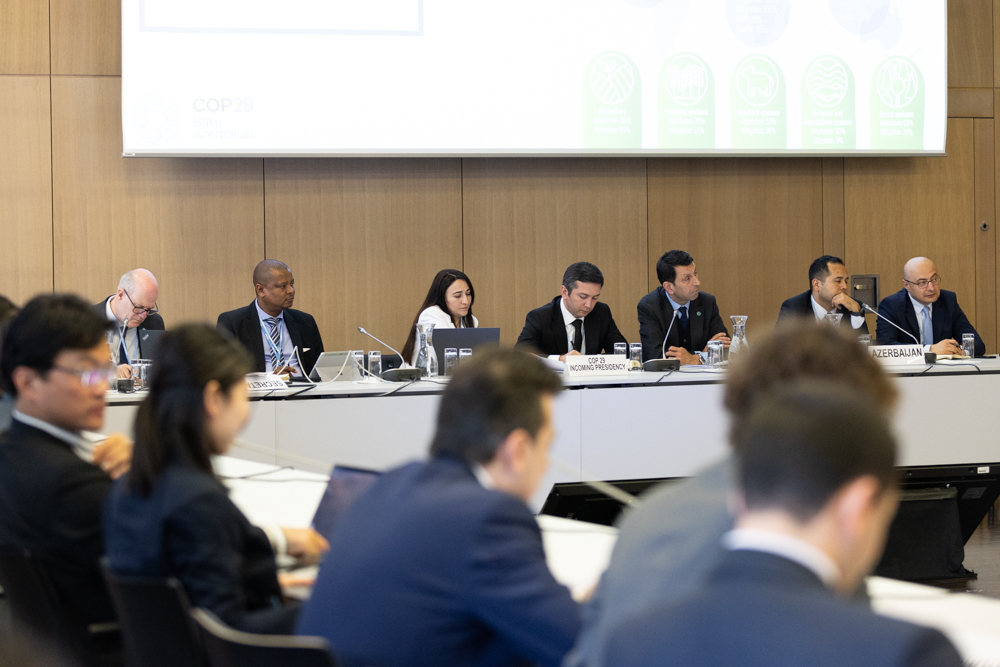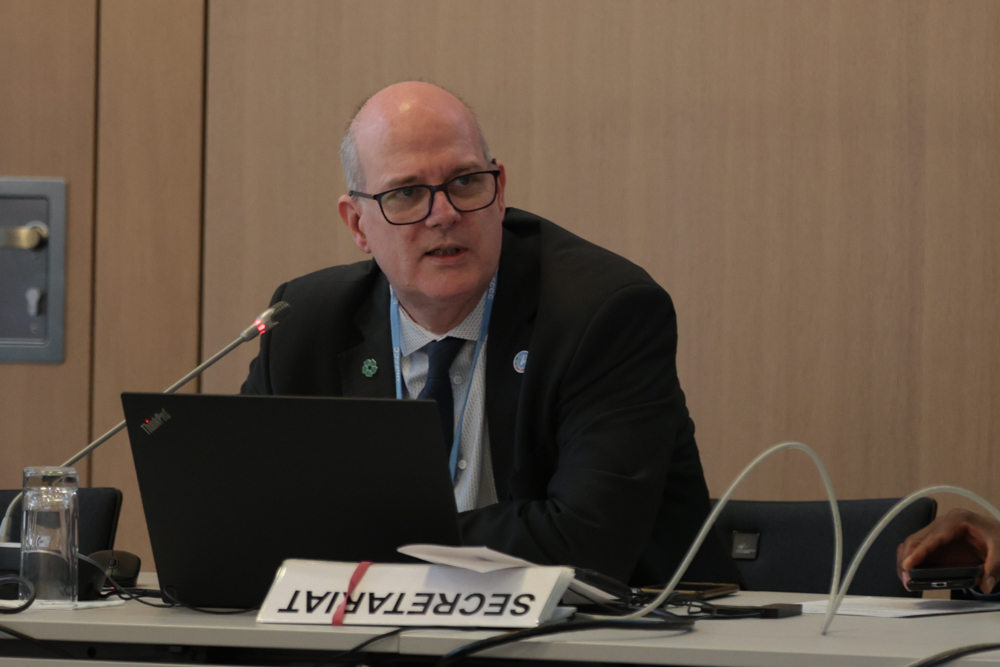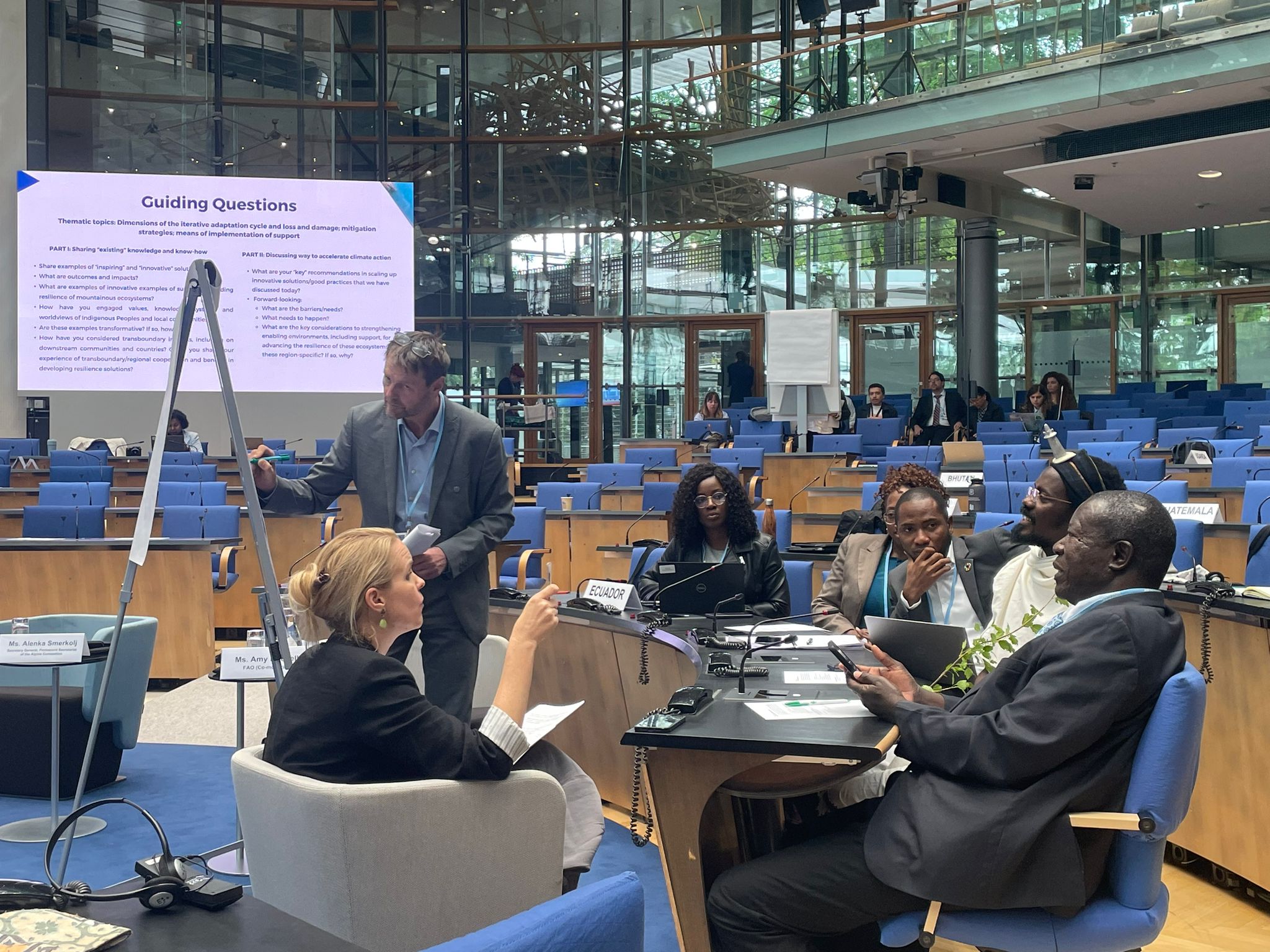Food systems front and center of climate talks in Bonn
The June 2024 meeting sets the scene for COP29 global climate summit in Azerbaijan

©IISD/Chiara Worth
Finance focus
Seeing agriculture and food security so prominent in the Bonn session is a good sign that COP29 can deliver on placing agrifood solutions at the heart of the climate action agenda, FAO Director of the Office of Climate Change, Biodiversity and Environment, Kaveh Zahedi has concluded at the close of climate talks in Bonn.
Close to 4 000 delegates from nations worldwide attended the Bonn Climate Change Conference from 3 to 13 June in Germany. The event plays an important role in shaping the agenda for the 2024 UN Climate Change Conference (COP29) this November in Baku, Azerbaijan.
Significant developments included advances in the draft negotiating text for the New Collective Quantified Goal on climate finance (NCQG), greater focus on transparency ahead of the delivery of new Enhanced Transparency Framework reporting tools later this month and finally an agreed draft text for the Sharm el-Sheikh joint work on implementation of climate action on agriculture and food security. Another major milestone was the recognition of the essential role of farmers in the newly launched COP29 Harmoniya Initiative.
The UNFCCC High-Level Champions for COP28 and COP29 and the Marrakech Partnership for Global Climate Action also held events where FAO contributed, speaking of the urgency to scale up adaptation, increase finance and build resilience across the agrifood systems.
“At this year’s Bonn Climate Change Conference, we were delighted to see the dedicated track on agriculture and food security move into implementation mode. But we know that achieving the Paris Agreement needs us to go much further in scaling up agrifood solutions to deliver on adaptation and mitigation ambitions. And this can only happen with a step change in finance ” Said Kaveh Zahedi

Agrifood initiatives and partnerships
A COP29 Presidency initiative Harmoniya 4 Climate Resilience: Empowering Farmers, Villages, and Rural communities, supported by FAO, was introduced at Bonn, will serve as a hub for work on agrifood systems during COP29. It will encourage the sharing of experiences, giving farmers and rural communities a chance to identify gaps and synergies, as communities and countries struggle to achieve climate commitments. Lively discussions at the side event, attended by over 200 participants, drew attention to the need for greater private sector involvement and farmers' participation in policymaking.
Members and partners of the Food and Agriculture for Sustainable Transformation (FAST) Partnership also met on the sidelines of the Bonn Climate Change Conference. With less than 20 percent of climate-related development finance reaching agrifood systems in 2020, the FAST Partnership fosters COP-to-COP collaboration and promotes cooperation between governments, intergovernmental organizations, development banks, civil society, women, youth and farmers' organizations, to enhance the quantity and quality of climate finance directed to those left vulnerable by climate change.
“The FAST Partnership aims to better connect and accelerate the many initiatives working on the nexus of climate and agriculture,” FAO Senior Natural Resources Officer and FAST Partnership Task Force Co-Lead, Martial Bernoux said.
“We need an ‘all hands-on deck’ approach and partnerships are key to reducing the finance gap and encouraging greater investment in agrifood system solutions.”

Reigniting Sharm el-Sheikh joint work
Another much celebrated advance at Bonn was the agreement by countries on a conclusion for the Sharm el-Sheikh joint work on implementation of climate action on agriculture and food security, a four-year process that builds on the outcomes of the Koronivia Joint Work on Agriculture. The stalling of the Sharm el-Sheikh joint work decision, adopted at COP27 in 2022, left many disappointed at COP28.
The Sharm el-Sheikh decision is the only dedicated formal process through which agriculture and food systems are included in the United Nations Framework Convention on Climate Change (UNFCCC). It recognizes the necessity of safeguarding food security and ending hunger as a priority, and the limited resilience of global food systems to the adverse impacts of climate change.
Land and forests remain at heart of climate action
COP28 in Dubai saw the goal of "halting and reversing deforestation and forest degradation by 2030" in an adopted UNFCCC decision for the first time. To inspire ambition for forests, the UNFCCC Secretariat organized a side event at SB60 on "REDD+ and forests in the Global Stocktake and Biennial Transparency Reports” where FAO was recognized for its key role in providing technical support to countries.
This year, mountains also featured in Bonn. A mandated Expert Dialogue on Mountains and Climate Change, convened by SBSTA Chair and supported by FAO and other partners, highlighted the importance of mountains in the global water cycle and the need to accelerate adaptation efforts in these unique ecosystems. And just down the street, the Bonn-based Global Landscapes Forum (GLF) hosted the GLF Peatlands 2024 hybrid event, which drew over 1200 participants to discuss peatlands – our forgotten climate heroes.
Together with the Center for International Forestry Research (CIFOR), FAO also launched a publication exploring opportunities to advance adaptation and mitigation through improved land use under the UNFCCC.

Strengthening agenda on aquatic systems
A briefing at Bonn on developments in aquatic foods in the climate agenda also provided a unique platform for dialogue and collaboration. The side event was organized by FAO, WorldFish, the Stanford Center for Oceans Solutions, and the German Federal Ministry for Economic Cooperation and Development. Climate negotiators and stakeholders from the sector discussed integrating aquatic foods into nationally determined contributions (NDCs) and the UNFCCC processes. They looked at linkages with biodiversity targets under The Biodiversity Plan and requested more examples of aquatic resources ocean management success stories.
Supporting Transparency
Several events at Bonn shared details of support for countries in the preparation of their Biennial Transparency Reports (BTRs), ahead of COP29. These reports provide a snapshot of progress made by countries in meeting the objectives of the Paris Agreement. This informs the Global Stocktake (GST), which takes place every five years, and evaluates progress on climate action, assessing advances in limiting global warming and adapting to its impacts.
FAO Director Kaveh Zahedi reiterated FAO’s continued willingness to assist countries, including by leveraging finance for capacity building in transparency and BTR preparation; technical help to strengthen monitoring, reporting and verification (MRV) systems; and helping countries develop their next generation of nationally determined contributions.
Learn more
Webpage: FAO at COP29
Website: FAO Climate Change
Publication: FAO Strategy on Climate Change